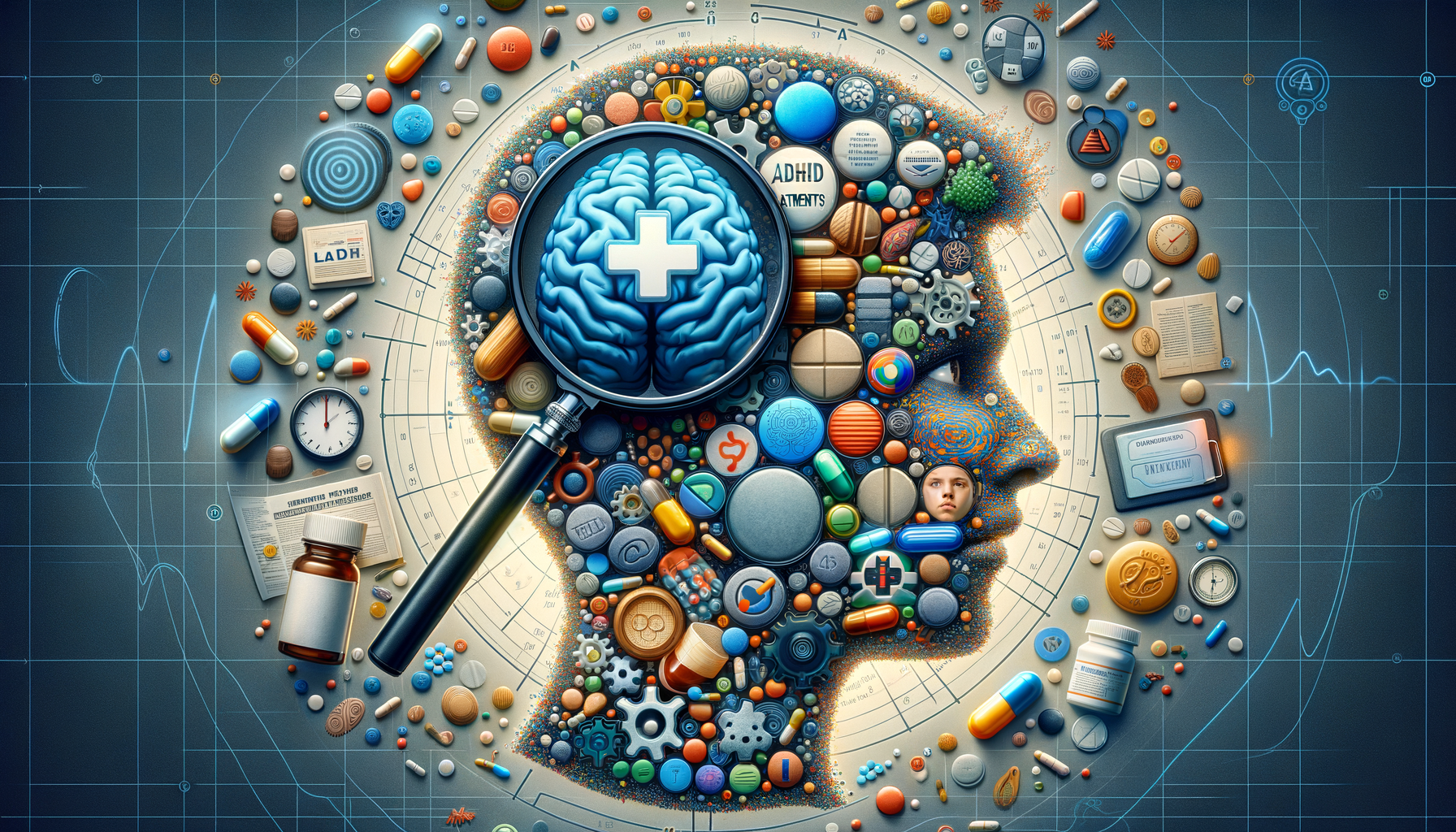Understanding ADHD: A Brief Overview
Attention Deficit Hyperactivity Disorder (ADHD) is a neurodevelopmental disorder characterized by symptoms such as inattention, hyperactivity, and impulsivity. These symptoms can significantly impact daily functioning and quality of life. Understanding the nature of ADHD is crucial for exploring effective treatments. ADHD affects both children and adults, and its prevalence has been increasing over the years. According to the Centers for Disease Control and Prevention (CDC), approximately 6.1 million children in the United States have been diagnosed with ADHD at some point. The disorder is not limited to childhood, as many adults continue to experience symptoms throughout their lives.
The exact cause of ADHD remains unknown, but research suggests that a combination of genetic, environmental, and neurological factors may contribute to its development. Genetic studies have shown that ADHD tends to run in families, indicating a hereditary component. Environmental factors such as prenatal exposure to tobacco, alcohol, or drugs, as well as premature birth, may also increase the risk of developing ADHD.
Understanding these underlying factors is essential for tailoring treatment approaches that address the specific needs of individuals with ADHD. This comprehensive understanding forms the foundation for exploring various treatment options, which aim to manage symptoms and improve overall well-being.
Medication: A Key Component in ADHD Treatment
Medication is often considered a cornerstone in the treatment of ADHD, particularly for managing symptoms of inattention and hyperactivity. The most commonly prescribed medications for ADHD are stimulants, which have been shown to be effective in approximately 70-80% of patients. These medications work by increasing the levels of certain neurotransmitters in the brain, such as dopamine and norepinephrine, which play key roles in attention and behavior regulation.
Stimulant medications can be classified into two main categories: methylphenidate-based and amphetamine-based. Methylphenidate-based medications are known for their ability to improve focus and reduce impulsivity. Amphetamine-based medications, on the other hand, are often prescribed for their longer duration of action and effectiveness in reducing hyperactive behaviors.
While stimulant medications are highly effective, they are not without side effects. Common side effects may include decreased appetite, insomnia, and increased heart rate. It is important for individuals taking these medications to be closely monitored by healthcare professionals to ensure optimal dosage and minimize adverse effects.
For individuals who do not respond well to stimulants or experience significant side effects, non-stimulant medications may be considered. These medications work differently from stimulants and can be effective in managing ADHD symptoms for some patients. Non-stimulant options include medications that affect norepinephrine levels in the brain, providing an alternative for those who cannot tolerate stimulant medications.
Behavioral Therapy: Enhancing Life Skills
Behavioral therapy is another important aspect of ADHD treatment, focusing on improving the individual’s behavior and life skills. This therapy involves working with a mental health professional to develop strategies that help manage ADHD symptoms and improve daily functioning. Behavioral therapy is particularly beneficial for children and their families, as it provides tools to address disruptive behaviors and enhance social skills.
One common approach within behavioral therapy is Cognitive Behavioral Therapy (CBT), which helps individuals identify and change negative thought patterns and behaviors. CBT can be especially helpful for adults with ADHD, as it equips them with techniques to manage time, organize tasks, and improve problem-solving skills.
Parents of children with ADHD can also benefit from Parent Training and Education Programs. These programs teach parents effective strategies for managing their child’s behavior, creating a supportive and structured environment at home. Techniques such as positive reinforcement, setting clear expectations, and implementing consistent routines are emphasized to help children with ADHD thrive.
Moreover, school-based interventions play a crucial role in supporting children with ADHD in educational settings. Individualized Education Plans (IEPs) or 504 Plans can be developed to accommodate the unique needs of students with ADHD, ensuring they receive appropriate support and modifications in the classroom.
Lifestyle Modifications: Supporting ADHD Management
Lifestyle modifications can significantly impact the management of ADHD symptoms. Incorporating healthy habits and routines into daily life can enhance overall well-being and complement other treatment approaches. Regular physical activity, for instance, has been shown to improve attention and reduce hyperactivity in individuals with ADHD. Exercise increases the production of neurotransmitters like dopamine, which can help regulate mood and behavior.
Dietary considerations also play a role in managing ADHD symptoms. While no specific diet has been proven to cure ADHD, certain dietary changes may benefit some individuals. For example, reducing sugar and processed food intake and increasing the consumption of omega-3 fatty acids found in fish can have positive effects on behavior and attention.
Sleep is another critical factor in managing ADHD. Many individuals with ADHD experience sleep disturbances, which can exacerbate symptoms. Establishing a consistent sleep routine and creating a calming bedtime environment can help improve sleep quality and, in turn, reduce ADHD symptoms.
Mindfulness practices, such as meditation and yoga, have gained popularity as complementary approaches for managing ADHD. These practices promote relaxation, focus, and emotional regulation, providing individuals with tools to cope with stress and improve attention.
Incorporating these lifestyle modifications into a comprehensive treatment plan can enhance the effectiveness of other interventions and contribute to a more balanced and fulfilling life for individuals with ADHD.
Alternative Therapies: Exploring Complementary Options
In addition to traditional treatments, some individuals with ADHD explore alternative therapies as complementary options. While these therapies may not replace conventional treatments, they can provide additional support and symptom relief for some individuals. It is important to note that the efficacy of alternative therapies varies, and individuals should consult with healthcare professionals before incorporating them into their treatment plans.
One popular alternative therapy is neurofeedback, a type of biofeedback that aims to train individuals to regulate their brain activity. During neurofeedback sessions, individuals receive real-time feedback on their brainwave patterns and learn to modify them through specific exercises. Some studies suggest that neurofeedback may improve attention and reduce impulsivity in individuals with ADHD.
Herbal supplements and nutritional interventions are also explored by some individuals seeking alternative approaches. Supplements such as zinc, iron, and magnesium have been studied for their potential effects on ADHD symptoms. However, it is essential to approach these supplements with caution, as their efficacy and safety are still being researched.
Acupuncture, a traditional Chinese medicine practice, is another alternative therapy that some individuals with ADHD consider. While research on its effectiveness for ADHD is limited, acupuncture is believed to promote relaxation and balance in the body, which may help alleviate certain symptoms.
Ultimately, the decision to explore alternative therapies should be made in consultation with healthcare professionals, considering the individual’s unique needs and circumstances. Combining alternative therapies with evidence-based treatments can offer a holistic approach to managing ADHD and improving quality of life.
Conclusion: Navigating ADHD Treatment Options
ADHD treatment is a multifaceted journey that requires a personalized approach to address the unique needs of each individual. From medication and behavioral therapy to lifestyle modifications and alternative therapies, a wide range of options is available to manage ADHD symptoms and enhance quality of life. It is essential for individuals with ADHD, along with their families and healthcare providers, to collaborate in developing a comprehensive treatment plan that incorporates evidence-based strategies and considers the individual’s preferences and goals.
While the path to managing ADHD may present challenges, it is also an opportunity for growth and empowerment. By exploring various treatment options and making informed decisions, individuals with ADHD can lead fulfilling lives and achieve their full potential. As research continues to advance our understanding of ADHD, new and innovative treatment approaches may emerge, offering even more hope and possibilities for those affected by this condition.




Leave a Reply